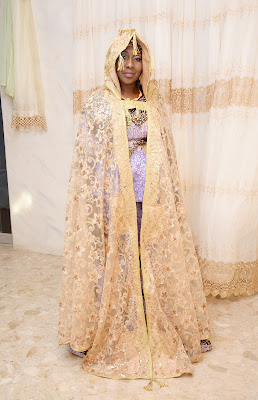The Hausa population resides mostly
in Northern parts of Nigeria. They constitute about half of the Nigeria
populace and speak Hausa language; though in different dialects.
The Hausa traditional marriage rites
is based mostly on Islamic jurisdictions. The ceremony
is not time consuming and mostly less expensive compared to Igbo and Yoruba
traditional marriages.
When a man sees the girl he wants to
marry, he will first seek permission from her parents. The family of the
future bride will then conduct investigation on the man to ascertain his
religious believes, moral, ethics and other issues related to his
background. He is allowed to see the girl only if he meets their
expectations. The man is not allowed to spend a lot of time when seeing
the girl according to Hausa tradition. Physical contacts, romance and
courtship before marriage are highly discouraged.
Once the girl accepts the marriage
offer, the man sends his parents or guardians to formally seek the permission
of the girl’s parents in marriage. The Hausa’s are not monolithic so
steps in seeking the girl’s hand in marriages varies among different groups
within Hausa communities.
However, the most common method used
in seeking the girl’s hand in marriage includes the grooms parents or guardians
visiting the bride’s parents with some gifts items such as Kolanuts,
traditional sweets and in some cases bags of salt.
The family of the intending Groom’s
makes their intention known during the visit. Gaisuwa is a
formal form of approval from the family of the Bride to the Groom’s proposal
and it is during this meeting that the Bride price is agreed upon by both
parties.
The Bride price starts from the minimum amount called “Rubu
Dinar” in Hausa, an Arabic phrase translated as “quarter kilogram of
gold piece” to the highest amount the man can afford to pay. The
preference is however for the Bride price to be as affordable as possible
because Islam teaches that the less amount paid as bride price produces the
most blessed marriage.
The wedding date is set during the
visit by both which is known as ‘Sa rana’ meaning date fixing.
It is part of the Hausa tradition for the Groom to provide a house while
furnishing the house is the full responsibility of the Bride’s family.
Wuni/sa lalle is an event strictly for
the ladies. This is when the Bride gets to spend the last bit of free time with
her friends and female members of her family, in her father’s house. A mixture
of henna is made and used to make beautiful designs on her hands, palms
and legs. Her friends and family also get henna designs on their hands but not
as elaborate as the bride.
The wedding date is called ‘daurin
aure’. It is the day of wedding Solemnization by the two families
upon payment of the Bride price referred to as sadaki on that
same day.
Culturally, a representative each
from both families usually do the exchange of vows in the presence of a
religious leader and many invited guests and prayers are offered to the newly
wedded couple. The wedding fatihah is the most significant event of the entire
wedding ceremony even though women are not allowed to participate in it. They
remain indoors, busy preparing the Bride for her transition from a single lady
to a married woman. This event is similar is similar to bridal shower or send
forth.
The wedding reception known
as the Walimah is conducted according to the taste of the
families involved. It is usually held after the wedding Fatihah (daurin
aure) and it goes on for a whole day with food and drinks available
for family, friends and well-wishers.
At the end of the celebration, the
Bride is taken from her Parents house to that of her husband’s which is
called Kai amariya. Family and friends escort the Bride to her
matrimonial home to be well received by the Groom’s family.
This is usually preceded by prayers
and advises from her family, in-laws and friends. This is not the end of events
in the Hausa cultural marriage. Depending on how affluent the families are.
In some parts of Hausa land, “Sayan
baki” takes place. This is a negotiation between the Groom’s men and
the Bridesmaids, debating on the amount to be paid before the Bride speaks to
her groom.
By Mercy KuKah



No comments:
Post a Comment